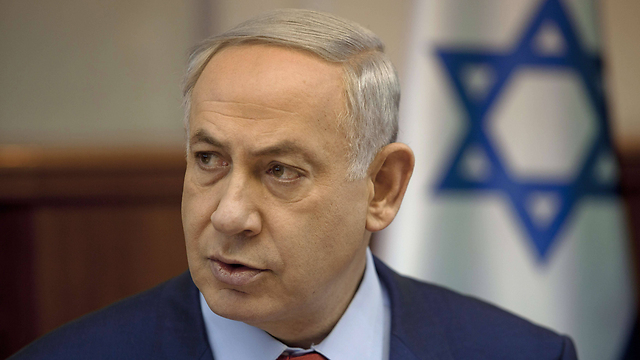
Netanyahu advances Jewish nation-state bill
Team headed by coalition chairman is attempting to dismantle obstacles that may block the proposal, which would enshrine as a Basic Law the definition of Israel as the nation-state of the Jewish people; PM also advances legislation which would extend voting rights to Israelis abroad.
Additionally, the team will be responsible for formulating wording for the bill that will be acceptable to all branches of the coalition.
In addition to Hanegbi, members of the committee will include Justice Minister Ayelet Shaked and MKs Yifat Shasha-Biton of Kulanu, Uri Maklev of United Torah Judaism and former minister Ariel Atias, who will represent Shas.
The nation-state law is a source of considerable division in the government. A few weeks ago, Netanyahu decided to postpone its approval in the Ministerial Committee for Legislation until a team had been established to deal with the proposed law.
Although Netanyahu has now decided to push ahead with the legislation, it is still unclear when the bill will be submitted to the coalition and what would be its wording.
The first clause in the Nationality Law would enshrine as a Basic Law the concept that Israel is the nation-state of the Jewish people. The clause also sets out that all Israeli law must be interpreted according to this principle. This imperative has already been set out before in Israel, when it was mandated that Israeli law defer to the principles of human rights as enshrined in the Basic Law: Human Dignity and Liberty.
The Basic Law also specifies some of the practical aspects of the State of Israel being the nation-state of the Jewish people. The law addresses state symbols (national anthem, flag, icons), Jerusalem as the capital, the language, the right of return, ingathering of the exiles, Jewish settlement, relations with the Jewish Diaspora, the Hebrew calendar and holy sites.
There are fears that the law will provoke civil and political clashes, primarily due to the reactions of Arab Israelis and the fear of being depicted globally as a nationalist state that advances nationalist laws.

"It is a sensitive law, because we don't want to hurt the Arab-Israeli public," said a senior coalition figure on Sunday. "We need to solve this in the coalition."
"I have recently heard voices from public groups in the country against our decision to outlaw the Northern Branch of the Islamic Movement. This will not change our decision one millimeter," Netanyahu said at the opening of the weekly cabinet meeting on Sunday.
"We stand by this decision just as we stand by passing the Nationality Law that will clearly set out Israel's being a Jewish and democratic state, the national state of the Jewish People.
"Within this framework, the discussions that we promised to hold will start this week led by coalition chairman MK Tzachi Hanegbi. We are starting to advance the legislation of the Nationality Law," Netanyahu added.
Netanyahu also appointed MK Yariv Levin (Likud) to deal with issues relating to changing the system of governance in Israel. Levin will head up coalition teams that will deal with these matters as well as with advancing the law for Israelis to vote from abroad.
Currently, Israelis who live abroad can only vote if they are in Israel on election day. A proposal to allow Israelis abroad to participate in elections has been put forward in the past and over the years, various assessments throughout Israel's political system have shown that the majority of overseas voters fall within the right-wing camp.
Statistics gathered in 2009 showed that 550,000 Israelis were living abroad at that time, not including children who were born outside Israel.
Other proposals under plan to change the system of governance would be to remove the need for the president to declare who will form the government, and that the responsibility for formation would be imposed on the largest party.











